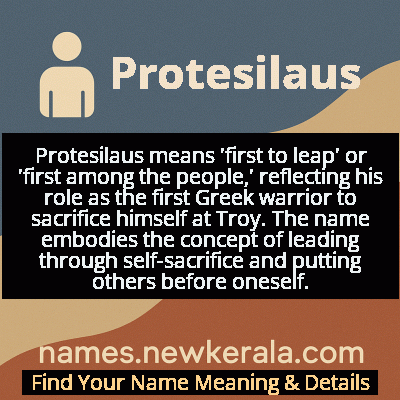Protesilaus Name Meaning & Details
Origin, Popularity, Numerology Analysis & Name Meaning of Protesilaus
Discover the origin, meaning, and cultural significance of the name PROTESILAUS. Delve into its historical roots and explore the lasting impact it has had on communities and traditions.
Name
Protesilaus
Gender
Male
Origin
Greek
Lucky Number
2
Meaning of the Name - Protesilaus
Protesilaus means 'first to leap' or 'first among the people,' reflecting his role as the first Greek warrior to sacrifice himself at Troy. The name embodies the concept of leading through self-sacrifice and putting others before oneself.
Protesilaus - Complete Numerology Analysis
Your Numerology Number
Based on Pythagorean Numerology System
Ruling Planet
Moon
Positive Nature
Diplomatic, friendly, artistic, empathetic.
Negative Traits
Over-sensitive, moody, indecisive, prone to self-pity.
Lucky Colours
Green, cream, white.
Lucky Days
Monday.
Lucky Stones
Pearl, moonstone.
Harmony Numbers
1, 3, 4.
Best Suited Professions
Diplomats, mediators, caregivers, artists.
What People Like About You
Cooperative spirit, friendliness, artistic talent.
Famous People Named Protesilaus
Protesilaus of Phylace
Mythological Hero
First Greek warrior to die at Troy after leaping ashore despite prophecies
Protesilaus (Historical Figure)
Ancient Greek Noble
Ruler of Phylace mentioned in Homeric traditions as a respected leader
Protesilaus (Literary Character)
Tragic Hero
Subject of lost tragedies by Euripides and other playwrights exploring sacrifice themes
Name Variations & International Equivalents
Click on blue names to explore their detailed meanings. Gray names with will be available soon.
Cultural & Historical Significance
The cultural impact of Protesilaus extends beyond mythology into philosophy and literature, where his story has been interpreted as an allegory for leadership, sacrifice, and the human condition. Later Greek and Roman writers, including Ovid in his Heroides, expanded on his tragic love story with his wife Laodamia, adding emotional depth to his heroic sacrifice. Throughout classical antiquity, Protesilaus was venerated as a hero with cult worship at his supposed tomb in the Thracian Chersonese, where he was believed to have special powers to protect sailors and soldiers. His legacy represents the complex Greek understanding of heroism—not just as military prowess but as conscious self-sacrifice for communal benefit.
Extended Personality Analysis
Individuals named Protesilaus are typically associated with courageous, self-sacrificing, and principled personalities. They embody the archetype of the noble leader who places duty and the welfare of others above personal safety or comfort. This name suggests someone with strong convictions and the willingness to act on them, even when facing certain personal cost. Protesilaus personalities are often characterized by their sense of responsibility, their ability to make difficult decisions under pressure, and their commitment to causes larger than themselves. They tend to be natural leaders who inspire others through their example rather than through coercion or authority.
However, this heroic profile also carries potential challenges, including tendencies toward impulsiveness in critical moments and a sometimes tragic disregard for personal consequences. The Protesilaus personality may struggle with balancing personal relationships against larger duties, potentially leading to conflicts between private happiness and public responsibility. Their strength lies in their unwavering commitment to their principles, but this can manifest as stubbornness or an inability to compromise when faced with complex moral dilemmas. Ultimately, the Protesilaus character represents the paradox of heroic virtue—the very qualities that make someone admirable can also lead to their downfall, creating a complex personality that combines noble intentions with human vulnerability.
Modern Usage & Popularity
In contemporary times, Protesilaus remains an exceptionally rare name, primarily used in academic, literary, or highly specialized contexts rather than for actual naming of children. Its usage is almost exclusively confined to Greece and among classical scholars worldwide, where it serves more as a reference to mythological heritage than as a practical given name. The name occasionally appears in modern Greek literature, philosophical discussions, and classical studies as a symbolic representation of sacrificial leadership. There are no significant popularity trends to report, as the name has never entered mainstream naming practices and remains firmly in the domain of classical allusion and academic reference rather than practical application in modern society.
Symbolic & Spiritual Meanings
Protesilaus symbolizes the ultimate act of self-sacrifice and the paradox of heroic leadership—the idea that true leadership often requires being the first to face danger and potential destruction. Metaphorically, the name represents the concept of the 'first sacrifice,' embodying the principle that great achievements often demand someone to pay the initial, heaviest price. It serves as a powerful symbol of the tension between individual survival and collective success, between personal happiness and public duty. The name carries connotations of tragic heroism, where glory is achieved through conscious self-destruction for a greater cause, making it emblematic of the costs of war, the nature of sacrifice, and the complex relationship between individual action and historical consequence.

